
Search
Nonprofits providing products or services to base-of-pyramid consumers in emerging markets face the challenge of reaching those customers in “the last mile.” These are often rural, off-grid areas where transportation and telecommunications infrastructure is unreliable. The field agent – whose work can range from selling, installing and maintaining solar energy systems for a social enterprise to advising farmers on agricultural practices for an NGO – is frequently the first and most crucial link between these organizations and those they serve.
While important, a field agent network cobbled together by nonprofits can be difficult to monitor when located in far-flung regions; require a good deal of labor, especially if run on a paper-based system; and include significant upfront training for agents in sales, customer service, and product maintenance. Platforms like Salesforce.org Nonprofit Cloud and TaroWorks – a mobile, field-services tool that works both online and offline – are being used by these groups to drive down agent network costs and increase efficiency.
This mobile and cloud technology has digitized the collection of business metrics in the field by allowing you to gather such information with a smartphone or tablet. From there, operational trends can be analyzed through online reporting dashboards in close to real-time, helping line managers make data-driven business decisions. Our clients are now better able to oversee what the Helix Institute of Digital Finance considers key field agent network management functions – like selecting, training, monitoring, and compensating agents as well as guiding their customer-care efforts.
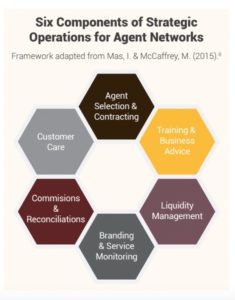
Image: Six components of field agent network operations Source: FIBR/BFA, May, 2018.
Here are two examples of social enterprises (and TaroWorks clients) helping advance sustainability through solar energy agent networks and a third case study highlighting how one of the United States’ largest charities monitors field agent productivity.
This company delivers solar products and clean cookstoves in developing countries through what Hystra, an inclusive business consulting firm, describes as the “local agent” model. This approach has helped Solar Sister build an agent network of over 3,700 largely female “micro-entrepreneurs” who buy the products from Solar Sister and resell them at a profit to consumers in locations like rural markets or at local savings groups across Uganda, Nigeria, and Tanzania.
Solar Sister estimates their work has benefited more than 1.5 million people with renewable energy and clean cooking products. This help can improve a household’s economic standing and health while providing a source of income, business experience, and leadership skills that are reinforced with training from Solar Sister staff.
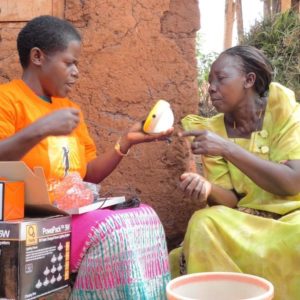
Image: Solar Sister entrepreneur demonstrates a solar lamp. Source: Solar Sister
Agent Selection and Contracting: Solar Sister used Salesforce and TaroWorks to convert from a previously paper-based process of recruiting micro-entrepreneurs to creating a digital application form, which could be filled out using a mobile device in remote areas that had little or no access to the internet or mobile phone data connections.
Over the course of a 15 minute interview, Solar Sister Business Development Associates can collect contact information, identify the entrepreneur’s location via GPS, take the individual’s photograph, capture their signature, and gather baseline demographic and other monitoring and evaluation data for Solar Sister funders. (For more information, see this webinar on Solar Sister’s TaroWorks app in action.)
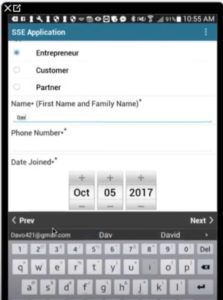
Image: TaroWorks mobile app form used by Solar Sister. Source: Solar Sister
Service Monitoring: Once the Solar Sister Business Development Associate is within range of connectivity, their activity information – like the application forms and sales results – can be synced from their mobile device to Salesforce.
Managers monitor the field agents’ activities and results with Salesforce dashboards. Having detailed data on each micro-entrepreneur available for analysis in near-real-time helped Solar Sister make a number of data-driven business decisions. For example, the organization changed a key performance indicator for Business Development Associates from the total number of micro-entrepreneurs recruited each month to how active each micro-entrepreneur was during that period, based on the number of products they bought from Solar Sister for resale.
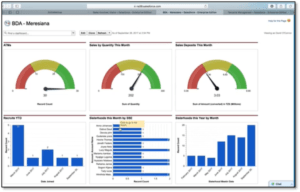
Image: Solar Sister dashboards in Salesforce. Source: Solar Sister.
Commissions: When certain entrepreneur activity levels were reached, the Business Development Associate received a bonus in recognition of their success. The associates were being rewarded based on the quality of would-be businesswomen they recruited into the program not the quantity. If these micro-entrepreneurs repeatedly bought Solar Sister products for resale, it was considered a sign they were building sustainable small businesses. (Read more from TaroWorks.)
Iluméxico
This organization offers access to solar systems for people living without electricity in remote, impoverished areas of Mexico. The company provides all the equipment, local training, and micro-financing their customers need to use the off-grid power systems and has installed more than 13,000 systems to date.
Customer Care: Iluméxico’s agents use TaroWorks and Salesforce to log and track maintenance case issues, coordinate problem resolution and monitor progress to prevent systemic difficulties. Iluméxico previously used pen and paper to log activities, which contributed to a lack of quality error tracking, case resolution times averaging more than two months, and a loss of customers if faulty devices weren’t fixed quickly.
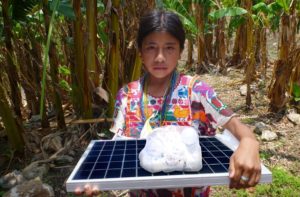
Image: Solar Panel. Source: Iluméxico
Solar energy companies like Iluméxico can face problems with the product’s manufacturing, installation efforts, or operation. As we’ve observed before:
“For Iluméxico, the chain of responsibility for resolving such issues begins with the field agent who reports the issue using their TaroWorks mobile app, the operations director who routes the issue to the right party, and the quality and manufacturing teams who resolve the issue. When field agents notice a quality issue on a site visit, they’ll fill out the quality report form to log the type of issue, add additional information about the case, and take a photo.
Once they sync with Salesforce.org Nonprofit Cloud platform, a case record is generated and the operations director is automatically notified by email that a new case has been created. The manufacturing team will make necessary changes, log their solution, and close the case. Aggregating all of this information in the cloud allows anyone accessing a customer’s account to see the entire history of the relationship Iluméxico has had with that household.” (Read more from TaroWorks.)
Service Monitoring: Like Solar Sister, Iluméxico analyzed this data using Salesforce dashboards and then determined that many of the initial maintenance and quality issues were related to panel cables and missing installation materials like screws and nails. These insights led them to change their shipment process and ultimately reduce maintenance tickets.
With more than $1 billion in annual revenue, this nonprofit NGO is one of the largest U.S.-based charities. One of its programs, Expanding Financial Inclusion Africa, set out to improve the resilience of poor and vulnerable households by forming Savings and Internal Lending Communities, which used a microfinance approach to help people save and borrow to increase their incomes.
To measure program results, Catholic Relief Services (CRS) sent field researchers into Zambia with the TaroWorks app on their smartphones and a plan to collect the “financial inflows and outflows” of 270 households using a methodology known as financial diaries, which records “data on income, consumption, savings, lending, and investment” during weekly household visits. CRS staff said this monitoring and evaluation technique, which resulted in the collection of 55,000 financial diaries, was bolstered by their decision to switch from paper-based to digital tools about 40 weeks into the more than two-year data collection and analysis effort.
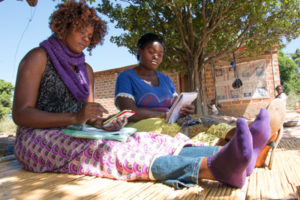
Image: CRS Financial Diaries Interview. Source: Henry Tenenbaum, 2016/Catholic Relief Services
Service Monitoring: One of the challenges the project’s expansive field researcher network posed was keeping these enumerators on schedule to make weekly household data collection visits.
“Study logistics were made even harder by the fact that ‘respondents in the Northern Province of Zambia live a transient lifestyle, with seasonal migrations to neighboring villages for fishing, agriculture and yearly harvests of various non-wood forest products,’ said [CRS Research Officer Samuel Beecher, who managed the work]. Using TaroWorks’ field force management CRM capability, as each completed survey and household visit was uploaded [to the Salesforce CRM], it registered on a dashboard visible to field agents and their managers – even when mobile or internet service wasn’t available – so progress toward their data collection goals could be measured and targets adjusted as needed.” (Read more from TaroWorks.)
A 2018 assessment by Financial Inclusion on Business Runways (FIBR), a project of financial services consulting firm Bankable Frontier Associates (BFA), highlights the need for additional investment in technology to support field agent networks fostering financial inclusion in the developing world. This thinking, however, also applies to a range of field agent networks serving cleantech, agriculture and other industries in emerging markets.
“Discussions about the convergence of technology and finance most often focus on a new class of products for customers. However, in the developing world, fintech companies still need access to agent channels to distribute these new products, which would not make it very far on analog agent networks. If we are serious about innovation in digital finance products, we need to invest in agent networks.” (Source: Digital Solutions for Analog Agents: New Technologies to Manage Agent Networks.”)
Editor’s Note: This blog post appeared originally on the Salesforce Foundation blog.
POST TOPICS
Sign up to receive emails with TaroWorks news, industry trends and best practices.
TaroWorks, a Grameen Foundation company.
Site by V+V